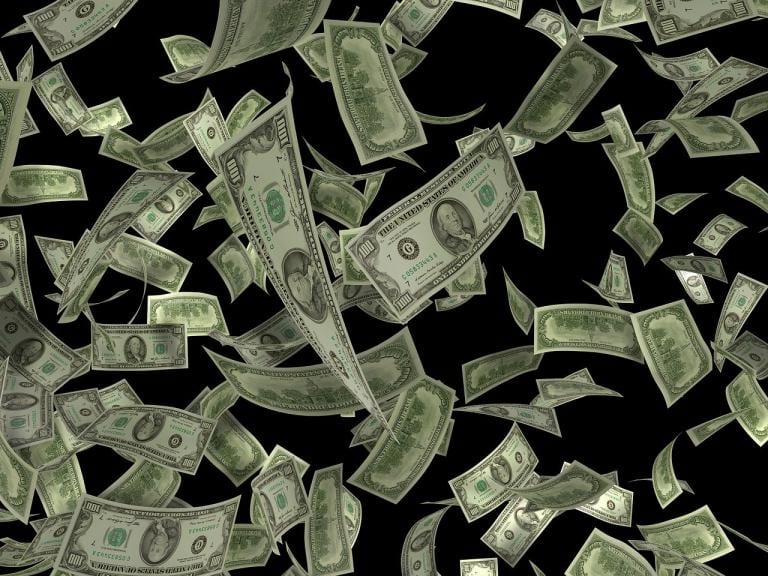For the next round of coronavirus bailouts, some Democrats are proposing to pay virtually every American $2,000 per month. A Republican idea is for the government to pay 80% of most Americans’ salary. Another idea is for the government to pay our mortgages or rent for a year.
Senators Bernie Sanders (I-Vt), Kamala Harris (D-CA), and Ed Markey (D-MA)–two former presidential candidates, one of whom could well be the Vice Presidential nominee–have put forward the Monthly Economic Crisis Support Act. It would pay $2,000 every month to every American who makes under $120,000. This would include up to three children in a family. Thus, a family of five, or more, would receive $10,000 per month. Over a year, that would come to the $120,000 benchmark, striking a blow for income equality across the land. (This variation sets the level at $120,000 per person, so it would apply to households making as much as $240,000.)
But the $10,000 per month would be on top of what the recipients are already bringing in. The average household income in 2019 was $89,930.70. So that family of five struggling through the coronavirus epidemic would make an annualized rate of $209,930.70. Or, on a monthly basis, a family currently getting that average income of $7494 would now get an additional 133%, for a total of $17,496. Every month!
This $2,000 monthly payment would go to every U.S. resident, including those who do not have Social Security numbers, so it would presumably be given also to illegal immigrants.
This income supplement would last not only through the coronavirus epidemic, however long that might be, but it will keep going three months after the epidemic is over!
What a deal! Who would turn that down? Take a moment to fantasize about this. What would an extra $2,000 per person every month do to your household budget? Maybe you have philosophical objections to the federal government spending this kind of money, but, come on. . .deep down. . .wouldn’t it be nice to have?
Meanwhile, from the other side of the aisle, Republican wunderkind Sen. Josh Hawley (R-MO) is proposing that the government pick up most of the tab for the payroll expenses of all American companies. Specifically, he wants the government to pay 80% of Americans’ salaries, up to the median rate (variously estimated between $33,000-$50,000).
The Getting America Back to Work Act would apply to every business in America, whether it has one or hundreds of thousands of employees, with the idea of making it possible for the companies to keep their employees on the payroll, even though they might not be working. This would extend, according to Sen. Hawley, “for the duration of the health emergency, until businesses are able to reopen.” The measure would include additional bonus incentives so that businesses could rehire everyone they had to lay off.
Among similar proposals being made for Phase 4 of the coronavirus bailout is for the government to pay everyone’s mortage or rent payments for a year. The Rent and Mortgage Cancellation Act would cancel all housing payments for a year, with the federal government reimbursing landlords and mortgage holders.
I have seen no estimates of what any of these ideas would cost, but the amounts would be staggeringly overwhelming.
Now I’m not against government bailouts during the epidemic. As someone has pointed out, the 5th Amendment to the Constitution says that “private property” may not “be taken for public use, without just compensation.” We have property rights in our labor. So if the government stops people from working or from operating their business, it is fitting that they be compensated.
But can the government really pay its entire population a middle class wage, or pay the salary of much of the nation’s labor force, or pay everyone’s housing expenses?
An economy is not just a matter of putting currency in people’s pockets. Money is a unit of exchange and must be supported by productivity and objective measures of value. When production has fallen so precipitously, how could putting more money into circulation do anything but create ruinous inflation?
Some 20.5 million Americans are unemployed due to the coronavirus shutdown, an unemployment rate of 14.7%, the highest rate since the Great Depression, when it hit 25.5%). Though the previous bailouts have contributed to that. The $600 a week supplement to unemployment checks has enabled companies to lay off workers with impunity–often promising to hire them back when business reopens again–with some workers asking to be laid off, since they would get more money on unemployment than they would if they were still on the payroll. It’s good that the people who have lost their jobs are getting taken care of, but the CARES Act is increasing unemployment, with all the negative repercussions that has. When you pay for something, you get more of it. So we are paying for more unemployment.
So what would these other, even more radically generous and unfathomably more expensive bailouts do? The economy at the best of times is a finely tuned mechanism, with even slight developments–a drop in auto sales, a price spike in energy, an interest rate increase– having repercussions throughout the whole. What would massive interventions like these do?
After all, the federal deficit for 2020 is already projected to be over $3.8 trillion, which will give us a public debt of over $20 trillion, which is larger than the entire Gross Domestic Product, the first time that has happened since World War II.
You might think, Congress will never pass these give-aways. But are you sure? Wouldn’t they be incredibly popular among voters? They may be politically irresistible. Senate Majority Leader Mitch McConnell (R-KY) wants to put the brakes on bailouts, but do you think President Trump would oppose them? He is a man of the people, after all, and he may well want to steal the Democrats’ thunder and get credit for what would surely be a politically popular move in giving people free money. And who could blame him? And what Republican lawmaker would oppose these or similar measures if the president and the public demanded them? Or do you think the president would draw the line at these kinds of programs?
UPDATE: House Democrats have announced a bailout plan they hope to vote on. It includes another one-time payment of $1200 per person, with a maximum of $6,000 per household; housing money for low income folks; more food stamps; unemployment benefits, including the $600 addition, through January; money to bailout local and state governments; more money for testing; more money for small businesses and non-profits; money to supplement the salaries of “essential workers,” etc. For details, go here.
Basically, this bill, called the HEROES Act, takes elements of those other proposals, while not adopting their most radical forms. The price tag, though, would be $3 trillion. The gargantuan CARES Act was $2 trillion.
We’ll see what the Republican-led Senate counters with, though the leadership is now calling for a hiatus of aid, in apparent hope that the economy will get going again without it.
Image by 3D Animation Production Company from Pixabay













